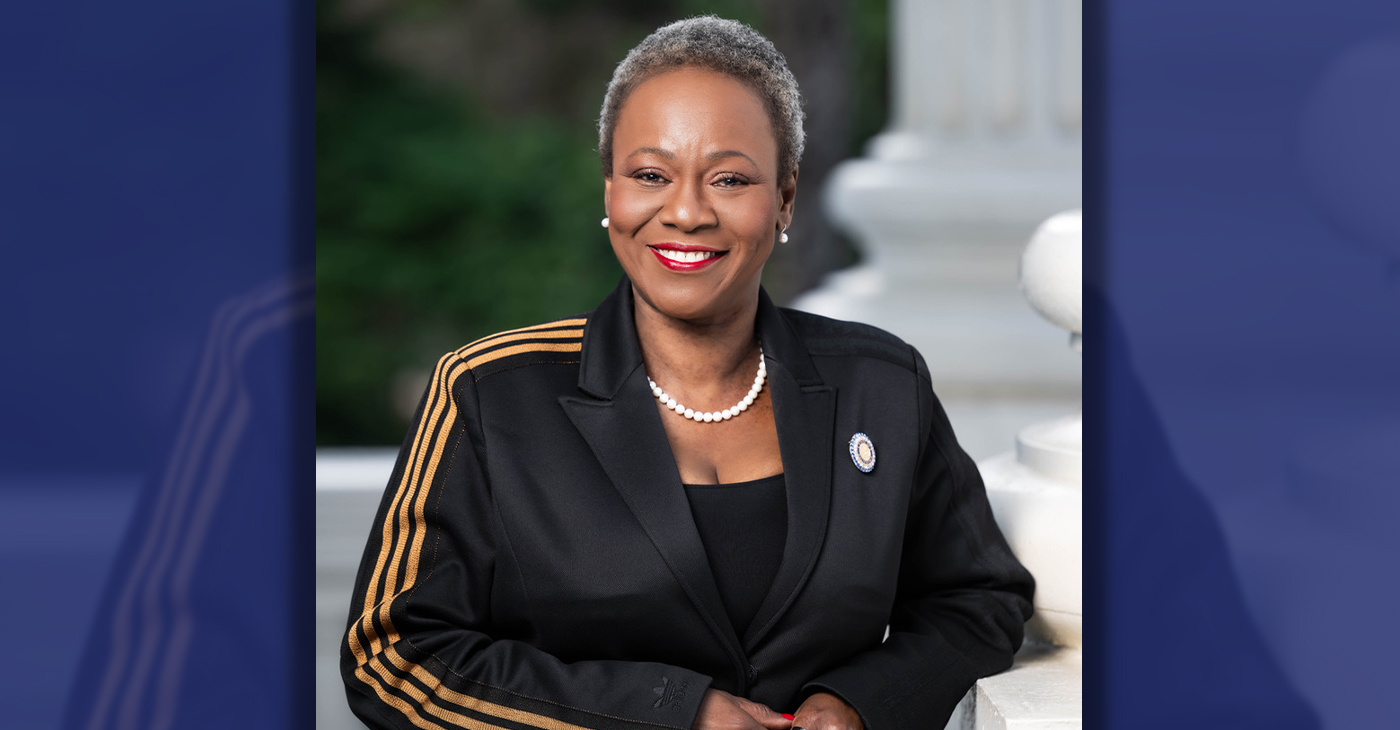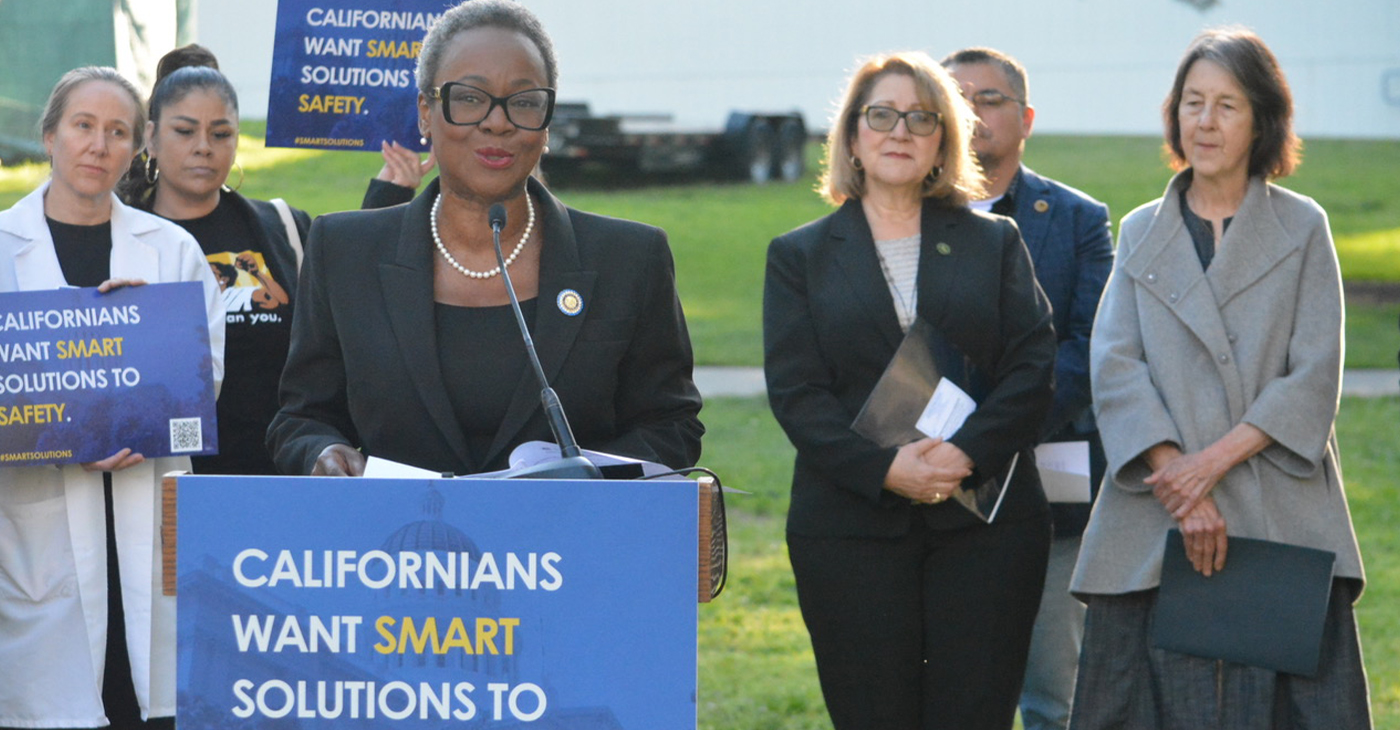California Black Media
California Black Media Political Playback: Black Candidates Are Queuing Up for Intense Political Battles Ahead
The 2024 general election is over a year away but candidates across California have begun throwing their hats in the ring to run for state office. Several Black candidates with experience, passion and solid connections to the state’s political inner circles are entering the fray.

Tanu Henry
California Black Media
Your roundup of stories you might have missed last week.
California Black Candidates Are Queuing Up for Intense Political Battles Ahead
The 2024 general election is over a year away but candidates across California have begun throwing their hats in the ring to run for state office.
Several Black candidates with experience, passion and solid connections to the state’s political inner circles are entering the fray.
Last week, Darryn Harris, former chief of staff to Los Angeles Mayor Karen Bass while she served in the United States Congress, announced that he is vying in the state’s 35th Senatorial District to replace Sen. Steven Bradford (D-Inglewood), who terms out next year. Others are expected to enter this race.
After Assemblymember Akilah Weber (D-La Mesa) announced that she is running in the election next year to replace State Senate pro Tempore Toni Atkins (D-San Diego), LaShae Sharp Collins, former district director for former Assemblymember and current Secretary of State Shirley N. Weber announced her candidacy. Her announcement states that she is a long-time resident of the 79th Assembly District in the greater San Diego area, a mother and foster parent with years of service in education and non-profit work. Colin Parent, vice mayor of the city La Mesa, has also announced that he is running for this seat.
CBM sources have also been told that civil rights leader, the Rev. Shane Harris is expected to enter the race. Harris is president and founder of the People’s Association of Justice Advocates.
In Senate District 5 former Tracy City Councilwoman Rhodesia Ransom announced last month that she will be running to replace Sen. Susan Eggman (D-Stockton) when her term ends in 2024.
In the Inland Empire, African American candidate Dejonae Shaw, a nurse and union leader, announced she is running for the 50th District Assembly Seat, representing parts of San Bernardino and Los Angeles County, after Assemblymember Eloise Reyes announced she will be running for State Senator in 2024 the 29th District.
Former Assemblymember Sandré R. Swanson has announced that he is running to replace Sen. Nancy Skinner in Senate District 7, which covers Oakland and surrounding communities.
Heather Hutt Is Sworn in To Replace Mark Ridley Thomas on L.A. City Council
Los Angeles’s embattled city council has a new member.
With an 11 to 1 vote last week — and to rounds of applause — councilmembers in California’s largest city decided to appoint Heather Hutt to serve the remainder of former councilmember Mark Ridley Thomas’s term instead of holding a special election. Ridley Thomas lost his seat representing the city’s 10th district after he was convicted on federal corruption charges last month.
Shortly after, Hutt, who was district director to Vice President Kamala Harris when she was U.S. Senator, was sworn into office.
“It is an honor for me to serve the people of the 10th District. I just want to take a moment to thank my colleagues, council president and my friends and family, my staff and the constituents of the 10th District,” said Hutt after her swearing-in ceremony.
Los Angeles Mayor Karen Bass commended Hutt for her outstanding service, highlighting her “exemplary record.”
“I look forward to continuing to work with Councilmember Hutt to confront the critical issues facing Los Angeles like homelessness, public safety and the overall livability of our city,” said Bass.
Following Ridley Thomas’ suspension last year, Hutt was selected to act as caretaker of his seat after former Councilman Herb Wesson resigned as interim replacement.
Assemblymember Reggie Jones-Sawyer Wants State to Use Prison Savings for Crime Reduction Programs
Assemblymember Reggie Jones-Sawyer (D-Los Angeles), a member of the California Legislative Black Caucus, is advocating for the state to allocate the projected annual savings of $235 million from shutting down prisons toward programs aimed at crime reduction.
Last week, Jones-Sawyer and Assemblymember Juan Alanis (R-Modesto), who co-authored Assembly Bill (AB) 912 — the legislation that would write the proposal into state law — held a rally at the Firefighters Memorial in Sacramento.
AB 912 would establish “the Youth Reinvestment Grant Program, to be administered by the Office of Youth and Community Restoration, for the purpose of implementing a mixed-delivery system of trauma-informed health and development diversion programs for youth, as specified,” according to the bill’s language.
Jones-Sawyer said the Assembly Education Committee has approved AB 912 with a 6-0 vote.
“Investing in our youth & preventative crime programs is exactly what my bill, AB 912, does,” Jones-Sawyer shared on his Facebook page with the hashtag #educationnotprisons.
The Assembly Appropriations Committee is now reviewing the bill.
March Income Tax Revenue is 10% Below Projections
Last week, the California Department of Finance announced that personal and corporate income taxes collected so far this year, totaling $923 million, is 10% below the number Gov. Newsom projected as a basis for his budget proposal in January.
Based on the weak revenue collection, analysts project that total income tax for the 2022 to 2023 fiscal year could be up to $5 billion below projections.
By law, the governor’s office will release an updated forecast of tax income revenue on or before May 14.
California Black Media will keep watching this story to keep our readers updated.
Alameda DA Pamela Price Under Fire
Bay area residents have been leading rallies and protests encouraging voters to recall Alameda County African American District Attorney Pamela Price.
The demonstrations have been centered on what some residents view as Price’s leniency on crime since she took office in January and suspicion that she will cut a deal with three men from Richmond and Vallejo accused of killing a two-year-old toddler in a shootout on the 880 freeway.
With chants of “do your job,” “justice for Jasper” and “recall price,” the protest organizers have been rallying at the Alameda County Superior Court.
Price’s office released a statement.
“The District Attorney’s Office has not made any decisions regarding the charges in the murder of Jasper Wu. We gave this information directly to Jasper’s parents last week. We will continue to review the case, and will make decisions directly in accordance to the evidence,” the statement read.
California Black Media
Expert Advice: How to Protect Yourself From Bias and Backlash at Work
As reports of antisemitic and Islamophobic threats and acts of hate and violence increase in California and across the country, the California Commission on the State of Hate (Commission) and California Civil Rights Department (CRD) continue to encourage Californians to take advantage of anti-hate resources available statewide, including the California vs Hate hotline and website. “The Commission on the State of Hate stands united in shared humanity with the people of California in denouncing violence and hate,” said Commission Chair Russell Roybal in a statement.

By Edward Henderson, California Black Media
As reports of antisemitic and Islamophobic threats and acts of hate and violence increase in California and across the country, the California Commission on the State of Hate (Commission) and California Civil Rights Department (CRD) continue to encourage Californians to take advantage of anti-hate resources available statewide, including the California vs Hate hotline and website.
“The Commission on the State of Hate stands united in shared humanity with the people of California in denouncing violence and hate,” said Commission Chair Russell Roybal in a statement.
“We recognize what is happening in the Middle East has devastated communities in California. Unfortunately, when these horrific events occur, instances of hate tend to rise as well. No person, whether they are Jewish, Muslim, Palestinian, Israeli, or perceived as members of any of these groups, should be subject to prejudice or violence,” he added.
“If you experience or witness hate in California, we encourage you to contact CA vs Hate to report the incident and get connected to support and resources.”
Title VII of the Civil Rights Act of 1964 prohibits discrimination in all aspects of employment, including hiring, firing, pay, job assignments, promotions, layoffs, training, fringe benefits, and any other term or condition of employment. This prohibition extends to discrimination based on religion, national origin, and race.
One form is the adverse treatment of an individual based on their actual or perceived religious practices or membership in a particular racial or national origin group.
Another form is adverse treatment based on the assumption that the individual holds certain beliefs because of their religion, national origin, or race. There can also be adverse treatment due to the individual’s actual or perceived association with, or relationship to, a person of a particular religion, national origin, or race.
The UCLA Center for Equity and Inclusion recommends four tactics to respond to workplace bias or hate.
Interrupt Early
Workplace culture largely is determined by what is or isn’t allowed to occur. If people are lax in responding to bigotry, then bigotry prevails.
Use or Establish Policies
Call upon existing policies to address bigoted language or behavior. Work with your personnel director or human resources department to create new policies and procedures, as needed. Also ask your company to provide anti-bias training.
Go Up the Ladder
If behavior persists, take your complaints up the management ladder. Find allies in upper management and call on them to help create and maintain an office environment free of bias and bigotry.
Band Together
Like-minded colleagues also may form an alliance and then ask the colleague or supervisor to change his or her tone or behavior.
CA vs Hate is a non-emergency, multilingual hate crime and incident reporting hotline and online portal. Reports can be made anonymously by calling (833) 866-4283, or 833-8-NO-HATE, Monday to Friday from 9 a.m. to 6 p.m. PT or online at any time. Hate acts can be reported in 15 different languages through the online portal and in over 200 languages when calling the hotline. For individuals who want to report a hate crime to law enforcement immediately or who are in imminent danger, please call 911. For more information on CA vs Hate, please visit CAvsHate.org.
California Black Media
Commentary: Finding the Right Balance — Addressing Organized Retail Theft While Upholding Civil Liberties
Organized retail theft is a significant issue that impacts both consumers and businesses. While it is crucial to address theft and protect businesses from losses, we should also be mindful of safeguarding individuals’ constitutional rights, particularly the right to due process. AB 1990 by Assemblymember Wendy Carrillo, also known as the STOP Act, raises concerns about the balance between addressing theft effectively and ensuring civil liberties are upheld.

By Assemblymember Tina McKinnor | Special to California Black Media Partners
Organized retail theft is a significant issue that impacts both consumers and businesses. While it is crucial to address theft and protect businesses from losses, we should also be mindful of safeguarding individuals’ constitutional rights, particularly the right to due process.
AB 1990 by Assemblymember Wendy Carrillo, also known as the STOP Act, raises concerns about the balance between addressing theft effectively and ensuring civil liberties are upheld. This bill allows law enforcement officers to make warrantless arrests for shoplifting offenses not witnessed by the officer, as long as there is reasonable cause to believe the individual committed the crime. This bill has a dangerous potential for overreach and infringes on civil liberties, particularly the right to due process.
While the stated intention behind the STOP Act is to combat organized retail theft and protect businesses, there are valid concerns that this bill is an overreach and that existing law works, if properly enforced by our partners in law enforcement. A petty theft involving property stolen valued at $950 or less may be charged as a felony or misdemeanor (called a wobbler) if the offender has the following prior convictions: 1) at least on prior petty or theft-related conviction for which a term of imprisonment was served, and 2) a prior conviction for a serious or violent offense, for any registerable sex offense, or for embezzlement from a dependent adult or anyone over the age of 65. A misdemeanor can result in a sentence of up to one year in jail, whereas a felon can mean incarceration for 16 months, two years or three years. Let’s look at shoplifting in California. It occurs when a suspect enters a store, while that establishment is open, intending to steal property worth less than $950. The crime is considered a misdemeanor, punishable by up to six months in the county jail.
Granting officers the authority to arrest individuals based on reasonable cause, without witnessing the crime firsthand, can lead to negative consequences and possible violations of individual rights. Probable cause is the legal standard by which police authorities have reason to obtain a warrant for the arrest of a suspected criminal and for the courts to issue a search warrant. A grand jury uses the probable cause standard to determine whether or not to issue a criminal indictment. The principle behind the probable cause standard is to limit the power of authorities to conduct unlawful search and seizure of a person or its property, and to promote formal, forensic procedures for gathering lawful evidence for the prosecution of the arrested criminal. Reasonable cause does not require any of this due process and only requires that an officer reasonably believes that a crime has been committed. It is essential to find a middle ground that effectively addresses organized retail theft without compromising the fundamental rights of individuals.
California’s current laws, including the use of witness statements and surveillance evidence are sufficient for addressing suspected shoplifting and organized retail theft. California Attorney General Rob Bonta recently prosecuted Michelle Mack, a suspected organized smash and grab ringleader who paid twelve women to travel around California and commit over $8 million in retail theft at 21 different stores. AG Bonta used California’s current laws to have the suspect arrested and brought to justice.
The State of California is also making significant investments to address retail theft. Just this past year California invested an additional $267 million to combat organized retail theft. It has been less than a year and our law enforcement partners should have the opportunity to address this recent spike in retail theft crime.
Los Angeles County recently applied for and received a grant for the State of California for $15.6 million dollars to address retail theft enforcement. LA District Attorney George Gascon also recently formed an organized retail task force that partners with LA County Sheriff’s Department, Glendale, Beverly Hills, Burbank, Torrance and Santa Monica Police Departments to integrate their response to retail theft across the region. These collaborative efforts, such as those seen in initiatives like the organized retail task force in LA County, demonstrate the importance of a united approach to tackling theft while maintaining a balance between enforcement and civil liberties.
As we move forward, it is essential for policymakers, law enforcement agencies, businesses and communities to work together in finding solutions that effectively address organized retail theft without encroaching on individual rights. Ongoing evaluation and a commitment to thoughtful consideration will be crucial in navigating this challenge and fostering a safe and prosperous environment for all. Balancing the scales of justice to protect businesses while upholding civil liberties demands a comprehensive and conscientious approach from all stakeholders involved.
I am confident we can find that balance.
About the Author
Assemblymember Tina McKinnor (D-Inglewood) represents the 61st District in Los Angeles County, which includes parts of the South Bay, Inglewood, Hawthorne and Lawndale.
Antonio Ray Harvey
Sacramento Lawmakers Step Up Push for “Smart Solutions” on Crime, Public Safety
Assemblymember Tina McKinnor (D-Inglewood) and Sen. Lola Smallwood-Cuevas (D-Ladera Heights), both members of the California Legislative Black Caucus (CLBC), have joined other lawmakers and criminal justice reform advocates to address public safety in the state. On April 2, CLBC members gathered outside the State Capitol for the unveiling of the #SmartSolutions Public Safety Policy Platform, a package of 30 bills that addresses the top concerns of retailers, retail workers, the fentanyl crisis, and support for victims and survivors of crime.

By Antonio Ray Harvey, California Black Media
Assemblymember Tina McKinnor (D-Inglewood) and Sen. Lola Smallwood-Cuevas (D-Ladera Heights), both members of the California Legislative Black Caucus (CLBC), have joined other lawmakers and criminal justice reform advocates to address public safety in the state.
On April 2, CLBC members gathered outside the State Capitol for the unveiling of the #SmartSolutions Public Safety Policy Platform, a package of 30 bills that addresses the top concerns of retailers, retail workers, the fentanyl crisis, and support for victims and survivors of crime.
“Instead of being tough on crime, we need to be smart on crime,” Smallwood said at the press briefing. “I am not saying that we’re not going to be holding folks accountable for the actions that they take. But we will not rely on incarceration as a solution.”
McKinnor, Smallwood-Cuevas, a coalition of advocates, addiction treatment experts, and Yurok Tribal leaders joined Sen. Nancy Skinner (D-Berkeley), and Assemblymember Eloise Gómez Reyes (D-Colton) at the press conference organized to promote legislative solutions that ensure safety and justice.
Organizers say #SmartSolutions is an intersectional campaign that combats criminalization and mass incarceration by pushing for the redirection of state resources to fund housing, health care, schools, services for victims, and programs that reduce recidivism and promote accountability, beyond incarceration.
Opponents of the bills proposed in the #SmartSolutions campaign say their colleagues who support reform-focused strategies are looking the other way on crime and encouraging lawlessness.
For example, Assemblymembers Wendy Carillo (D-Boyle Heights), Carlos Villapudua (D-Stockton) and Mike Gipson (D-Carson) are supporting Assembly Bill (AB) 1990, legislation that would allow a peace officer to arrest shoplifters without a warrant or without witnessing the theft.
Assemblymember James Ramos (D-Highland) authored AB 1772 and introduced it in January. The legislation proposes sterner penalties for retail theft, particularly for repeat offenders.
The #SmartSolutions campaign is co-sponsored by Ella Baker Center for Human Rights, Smart Justice California, American Civil Liberties Union (ACLU) California Action, Californians for Safety and Justice, and Californians United for a Responsible Budget (CURB).
Smallwood recently introduced two bills she hopes will provide solutions to the escalating retail theft problem in the state. Senate Bill (SB) 1446 addresses theft, technology and job security in retail establishments and aims to minimize workplace violence, according to supporters. SB 1282 requires counties to expand the use of a diversion program for theft cases.
“Restorative Justice is the essential pillar of making our criminal justice system more fair, just, and equitable,” McKinnor said. “Restorative justice recognizes the trauma of victims and preparatory of crimes and provides a constructive space for victims to find healing.”
Dr. Amiee Moulin, founder of the California Bridge program and chief of the Division of Addiction Medicine at the University of California (UC) Medical Center, said drug “addiction and overdose” are taking a toll on patients, families and the community.
“I believe that California’s proposed legislation focused on expanding access to treatment is a crucial step towards saving lives,” Moulin said. “By removing barriers to care and embracing evidenced-based strategies we can provide patients the support they need to heal and recover.”
-

 Activism4 weeks ago
Activism4 weeks agoOakland Post: Week of March 20 – 26, 2024
-

 #NNPA BlackPress3 weeks ago
#NNPA BlackPress3 weeks agoCOMMENTARY: D.C. Crime Bill Fails to Address Root Causes of Violence and Incarceration
-

 #NNPA BlackPress3 weeks ago
#NNPA BlackPress3 weeks agoMayor, City Council President React to May 31 Closing of Birmingham-Southern College
-

 #NNPA BlackPress3 weeks ago
#NNPA BlackPress3 weeks agoFrom Raids to Revelations: The Dark Turn in Sean ‘Diddy’ Combs’ Saga
-

 #NNPA BlackPress3 weeks ago
#NNPA BlackPress3 weeks agoCOMMENTARY: Lady Day and The Lights!
-

 #NNPA BlackPress3 weeks ago
#NNPA BlackPress3 weeks agoBaltimore Key Bridge Catastrophe: A City’s Heartbreak and a Nation’s Alarm
-

 #NNPA BlackPress3 weeks ago
#NNPA BlackPress3 weeks agoBaltimore’s Key Bridge Struck by Ship, Collapses into Water
-

 Activism3 weeks ago
Activism3 weeks agoOakland Post: Week of March 27 – April 2, 2024














































